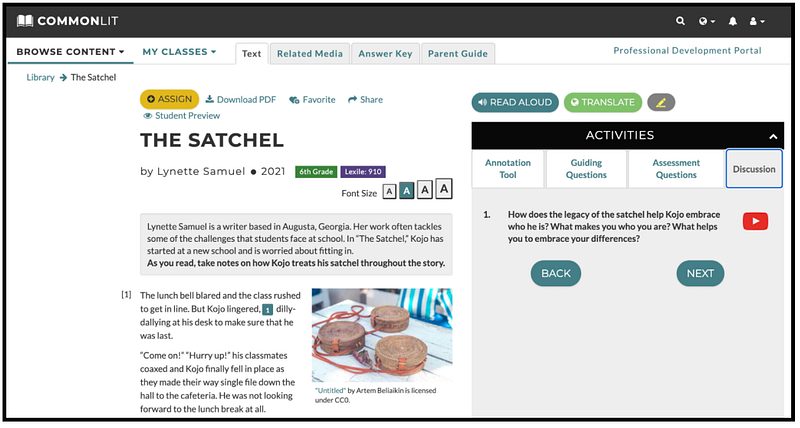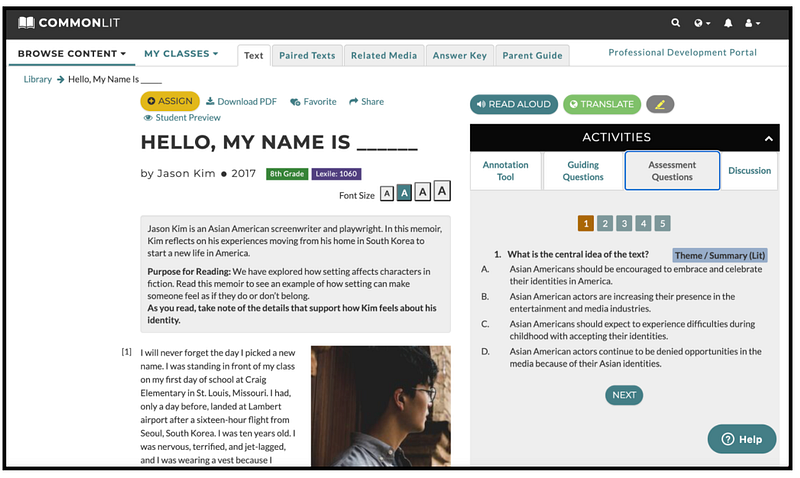 Secondary Classrooms
Who We Are: Lessons about Identity for Middle School and High School
Secondary Classrooms
Who We Are: Lessons about Identity for Middle School and High School
Check out these twelve high-interest lessons for middle and high school students about identity!
Adolescence is a time of growth and change. Students in middle and high school are figuring out who they are, who they want to be, and where they belong. As teachers, we want to support our students as they grapple with these big questions about their identities!
Here is a great set of texts from CommonLit for grades 6–12 that focus on the theme of identity. This diverse selection includes poems, short stories, informational texts, and more.
“Fish Cheeks” by Amy Tan (6th Grade)
In this memoir, Amy Tan describes an embarrassing Christmas Eve dinner. Tan’s mother cooks a feast of traditional Chinese dishes for relatives and friends, and the author despairs as their American guests try her favorite foods. This text is a great way to get students thinking about how our cultures and families influence our identities and our sense of belonging.
“The Satchel” by Lynette Samuel (6th Grade)
In this short story, Kojo is worried about fitting in at his new school. He is embarrassed when a classmate laughs at his lunch, which he carries in a worn satchel. When Kojo’s grandmother tells him how the men in his family have used the satchel for generations, he begins to take pride in his heritage and decides to give an oral report about the history of his lunchbox. This text can be used to start a meaningful discussion about the importance of celebrating our differences.

“Identity” by Julio Noboa (7th Grade)
In this poem, the speaker explores how it feels to be independent. The speaker uses powerful imagery to describe different kinds of flowers, which represent conformity and freedom. This text provides students with the opportunity to discuss the value of individuality and how embracing our independence can make us happier.
“How Autism Freed Me to Be Myself” by Rosie King (7th Grade)
In this transcription of a TED Talk, sixteen-year-old Rosie King shares her experiences with autism and how it has shaped her worldview. King describes how her vivid imagination has helped her succeed personally and professionally. The author’s emphasis on celebrating uniqueness and rejecting stereotypes will resonate deeply with middle school students who are trying to figure out who they are.
“Hello, My Name is _____” by Jason Kim (8th Grade)
In this memoir, actor Jason Kim describes his experiences growing up as a Korean immigrant in Missouri. As a child, Kim was desperate to fit in with his white classmates. When he moved to New York and started working as an actor, he learned to take pride in his culture. Middle school students who are trying to figure out where they belong will identify with the author’s discussion of how he tried to change his identity to fit in with his peers.

“Gate A-4” by Naomi Shihab Nye (8th Grade)
In this poem, the speaker helps a Palestinian woman at an airport. As the speaker and the woman wait for a delayed flight, they call friends and family to chat in Arabic and hand out cookies to other travelers. This poem is a powerful exploration of connectedness and provides students with the opportunity to think about how our communities shape our identities.
“Stories Saved My Life, and That’s Why I Write for Young People” by James Bird (8th Grade)
In this memoir, screenwriter and director James Bird shares how telling stories helps him express himself. When he was growing up, Bird’s teachers and classmates judged him for his differences. In high school, he moved to Minnesota to reconnect with his tribe, the Ojibwe, and realized that storytelling was in his blood. This text can be used to start a powerful discussion about the different facets of our identities and how we tell our stories.
“Self-Concept” by Saul McLeod (9th Grade)
In this informational text, psychologist Saul McLeod describes three components of self-concept, or how people perceive themselves. The interaction of our self-image, self-esteem, and ideal self shape our understanding of who we are. This text provides an interesting opportunity for students to think about the psychology behind how we view ourselves and analyze the different aspects of their identities.
“Everyday Use” by Alice Walker (9th Grade)
In this short story by award-winning novelist Alice Walker, a daughter comes home to her mother and sister with a new understanding of her identity. The author builds tension between the narrator, Mama, and her daughter, Dee, as they spar over what it means to be true to their heritage. This text offers students the chance to think about the complexities of the past and how our family histories shape our identities.
“By Degrees and Dilatory Time” by SL Huang (10th Grade)
In this short story, a man receives new eyes after being diagnosed with cancer. The main character struggles to adapt to his new vision and appearance, but he eventually begins to feel more like himself. This text provides students with a poignant example of how major life events can affect our understanding of who we are.
“What Your Most Vivid Memories Say About You” by Susan Krauss Whitbourne, Ph.D. (11th Grade)
In this informational text, Dr. Susan Krauss Whitbourne discusses how self-defining memories help shape our identities. Self-defining memories are easily remembered, emotionally intense memories that contribute to our understanding of who we are. This text can be used to start an interesting conversation about how we integrate important memories into our personal narratives.
“Excerpts from ‘Song of Myself’: 1, 2, 6, 52” by Walt Whitman (11th Grade)
In these excerpts from the epic poem “Song of Myself,” Walt Whitman writes about the interconnectedness of all things and people. With powerful imagery, the speaker develops his understanding of who he is in relation to the world around him. This text is a great way for students to think about how our identities are influenced by our environments.
Next Steps
Want to explore the theme of identity further with your students? Browse more texts about identity in the CommonLit library!
If you’re interested in learning all about CommonLit’s free digital literacy program, join one of our upcoming webinars!

